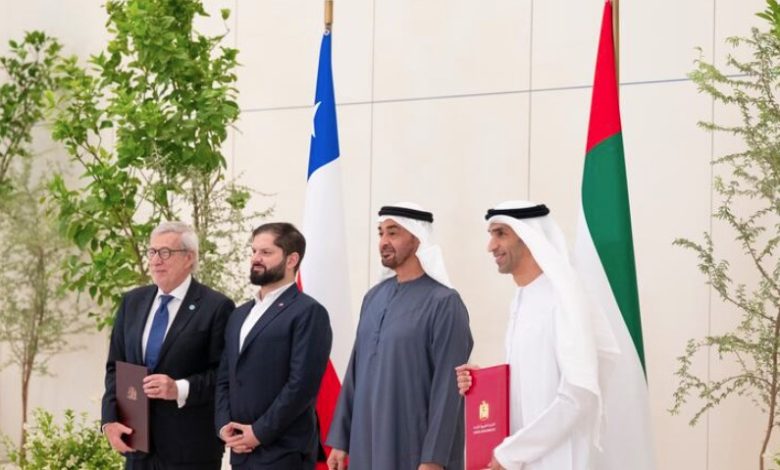UAE and Chile sign comprehensive economic partnership agreement to boost trade ties

The UAE and Chile have signed a comprehensive economic partnership agreement aimed at boosting the flow of trade and encouraging more investment between the two countries.
The UAE’s latest Cepa, signed during Chilean President Gabriel Boric’s visit to the Emirates, is expected to remove or reduce tariffs on goods, streamline customs procedures and eliminate other trade barriers.
The deal was signed by Dr Thani Al Zeyoudi, Minister of State for Foreign Trade, and Alberto van Klaveren, Chile’s Minister of Foreign Affairs, in Abu Dhabi, state news agency Wam reported. It was witnessed by President Sheikh Mohamed and Mr Boric.
Specific details of the agreement have yet to be disclosed.
I was pleased to meet Chilean President @GabrielBoric in Abu Dhabi today to discuss ways to enhance the strong ties between the UAE and Chile across key fields. Together, we witnessed the signing of the UAE-Chile Comprehensive Economic Partnership Agreement, which will build… pic.twitter.com/GH0rSWSruf
— محمد بن زايد (@MohamedBinZayed) July 29, 2024
A number of preliminary agreements have also been signed between the two countries, including in food security, agriculture, information technology and space. Discussions were also held to improve investment co-operation.
At the signing, Sheikh Mohamed said the agreement would support “mutual economic growth by providing opportunities for business communities and the private sector to expand on both sides”, Wam reported.
He also stated that the UAE’s Cepa programme aims to stimulate long-term economic diversification and sustainable growth, adding that the agreement between the Emirates and Chile establishes a vital trade and investment corridor with South America, which holds promising economic potential.
The Cepa is expected to lead to “significant economic growth and diversification” as it will “provide the UAE access to South American markets”, Michael Gelpke, chief executive of the Dubai-based Aymara International Fund, told The National.
“The signing of the Cepa shows a clear stance of the UAE to boost its position as a major hub for international trade and investment. This approach aims to promote economic diversification and decrease dependency on oil earnings by raising trade volumes,” Mr Gelpke said.
Chile is the fifth-largest economy in Latin America and the Caribbean, with an estimated gross domestic product of about $334 billion in 2024, data from Statista shows.
The UAE is seeking to expand trade with partners as it pursues its targets of Dh4 trillion ($1.1 trillion) in non-oil foreign trade and Dh800 billion in exports by 2031.
Last year, the country’s non-oil trade in goods reached a high of $701 billion, up 12.6 per cent annually.
The Emirates’ Cepa programme is expected to increase exports in the Arab world’s second-largest economy by 33 per cent and contribute more than Dh153 billion to GDP by 2031.
To further expand its trade, the UAE aims to sign 26 Cepas. While deals have been reached with India, Turkey, Israel, Indonesia, Cambodia, Georgia and, last week, Mauritius, talks are under way with Serbia, Vietnam, the Philippines, New Zealand and Ecuador.
Overall, Cepas are expected to add about 2.6 per cent to the UAE’s economy by 2030, Dr Al Thani previously said.
Non-oil trade between the UAE and Chile, which first established diplomatic ties in 1978, was estimated at more than $305 million in 2023, a growth of about 24 per cent since 2019, official data shows.
Chile’s exports to the UAE include potassium nitrate, sodium, wood and various food products while the Emirates exports phones, portable devices, electronic products and certain industrial materials to the South American nation.
“The Cepa improves market access for Emirati goods and services and draws in international investment,” Mr Gelpke said.





